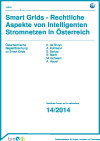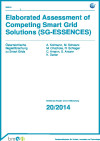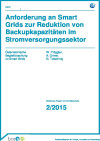Suchergebnisse für "Factsheet: Energietechnologien gestalten, die für alle sinnvoll und nutzbar sind"
e80^3-Buildings - Sub project 4: Demonstration object
Alongside the realisation of the plus energy building in Kapfenberg, a demonstration project is scheduled to be created that accomplishes an economically viable and technically innovative solution for the future.
Climate neutrality roadmap Feldkirch
Feldkirch has already implemented important measures in the field of climate and energy policy. The city is a member of a KEM and KLAR region and has been a very active e5-municipality since 2005.
S - House
Innovative Use of Renewable Resources demonstrated by means of an Office and Exhibition Building
Financing Models and Strategies for future Energy Infrastructures (FINAMO)
Contribution to decarbonisation 2050: The development of suitable financing models plays a key role when implementing new energy solutions. (Juli 2019)
Smart Grids - Rechtliche Aspekte von Intelligenten Stromnetzen in Österreich

Österreichische Begleitforschung zu Smart Grids
Schriftenreihe
14/2014
K. de Bruyn, A. Kollmann, et al.
Herausgeber: BMVIT
Deutsch, 247 Seiten
Downloads zur Publikation
Elaborated Assessment of Competing Smart Grid Solutions (SG-ESSENCES)

Österreichische Begleitforschung zu Smart Grids
Schriftenreihe
20/2014
A. Kollmann, M. Schwarz, et al.
Herausgeber: BMVIT
Deutsch, 124 Seiten
Downloads zur Publikation
Valuable (by-)products of gasification
19. - 20. October 2022
Living Hotel Kaiser Franz Joseph, Sieveringer Straße 4, 1190 Vienna, AT
The workshop will cover topics such as CHP (combined heat and power) / GHG (greenhouse gas) / synthesis products of gasification.
Kierling passive house - heading into the future sustainably
Using the example of demonstrational renovation, Kierling (built between 1977 and 1979) tests the possibilities of a renovation in passive house standard in technical, organizational and financial terms as an outstanding example of a comprehensive renovation.
COP5+ - Further development of a heat- and cooling system with seasonal heat storage at the example of Central Europe´s biggest geothermal depth drilling field
The aim was to increase the overall energy efficiency of Plus-Energy-Houses by making the heat excess of summer available for use in winter. This was carried out by improvements of the technology seasonal heat storage to an intelligent overall system. The biggest geothermal depth drilling field in Central Europe has been established.
Buildings of highest energy-efficiency with integrated renewable energy development
For the future supply of energy services the combination of energy efficiency, energy storage and decentralized use of renewable energy in buildings offers itself. The project identified dynamic potentials of possible active and passive energy yields of construction units with use of renewable energy sources, pointed future solutions to energy-efficient and ecological design of building construction-units and united all results to a signpost: From today's passive house to the energy-plus-house of the future.
PVOPTI-Ray, Optimization of reflecting materials and photovoltaics in urban environment with respect to energy balance and bioclimate.
Within the scope of the project PVOPTI_Ray the influence of reflection and energy balance on the performance of building integrated photovoltaics (PV) in complex urban environment have been investigated. Equally the influence of PV modules and of the energy conversion of solar energy at the PV module surface has an impact on micro climate and therefore also on pedestrians who are exposed to the radiation fluxes. This was also investigated.
CO-MOD - Increasing comfort and energy efficiency through improved lighting and air quality in schools - implementation through modular EPC-models and ESCO-networks
In general local educational institutions such as schools and kindergardens have a high average demand for improved comfort and energy efficiency improvements. CO-MOD develops a flexible, modular concept (with provider networks, various financing options incl. "Grandmother"-Energy Services, contract modules) that can also respond to the individual circumstances of smaller objects.
Energy Performance Contracting (IEA DSM Implementing Agreement - Task X)
The objective of this task within the IEA DSM programme is to facilitate the use of performance contracts and other energy service company (ESCO) contracts. In this scenario, the ESCO has taken on the project's performance risk by guaranteeing a specified level of energy savings. Its compensation for this risk is directly tied to achieving savings. The financing for such a project could come from the ESCO, the equipment supplier or a third-party company.
Voltage stabilization by central reactive power control of biogas power plants (Virtual Biogas Power Plant)
A virtual power plant, combining 20 agricultural biogas plants is planned in the south-eastern part of the State of Styria (A). The aim of the project is to realize a central reactive power control system of the biogas plants. Active power of this biogas plants ranges between 1 and 3 MW. Specific goals of the project are increasing grid stability, decreasing long distance reactive power transmission, decreasing energy losses, and decreasing utility costs.
IEA Bioenergy Webinar Series: Integration of gasification processes in biorefineries
30. June 2022
Online, AT
A webinar on how gasification technology can be used in existing industries/biorefineries.
Anforderung an Smart Grids zur Reduktion von Backupkapazitäten im Stromversorgungssektor

Österreichische Begleitforschung zu Smart Grids
Schriftenreihe
2/2015
W. Prüggler, A. Ortner, G. Totschnig
Herausgeber: BMVIT
Deutsch, 61 Seiten
Downloads zur Publikation
Secondary Materials in the Austrian Textile Industry - Study with Recommendations for the Austrian R&D-Politics
This study deals with the challenges and potentials for the use of secondary materials in the Austrian textile industry. It identifies challenges and potentials for establishing cycles in the textile industry with a focus on the use of secondary materials in Austria based on broad stakeholder involvement. Based on this, recommendations for research and development activities were formulated to promote recycling.
homeVALUE

The ecology and economy of housing. An assessment system for the evaluation of the suitability of buildings and housing estates for the future.
Climate neutrality roadmap St. Veit/Glan
St. Veit/Glan aims at advancing to a beacon for other small Austrian towns by developing strategies, measures and for building the capacity, necessary for achieving climate neutrality by 2040.
e80^3-Buildings - "reconstruction concepts towards energy plus house standard with prefabricated active roof and facade elements, integrated home automation and network integration"
The project aims for highly-efficient renovation of existing buildings and settlements in urban areas. The main focus are buildings that were built between 1950 and 1980.
